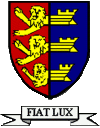Adapted by the editors from an article in the Newsletter by E. H. Baker.
If a quiz were set on “Dover Grammar School for Boys, 1931-81” the winner without much doubt would be E. H. Baker, Old Pharosian extraordinary. In 1931 he had just left school (1922-30) and was Headmaster’s secretary (1930-38) during the period when Fred Whitehouse handed over to J. C. Booth; editor of the Newsletter and committee member for more years than we care to remember, sometime president and constant scourge of the forgetful.
In response to the Headmaster’s request for reminiscences Ted Baker sent us three sheets of foolscap, from which editorial selection must be made.
Fred White house was known as the “Woodpecker” for tapping on interior form-room windows to quell undue noise. Years only enhance the esteem in which he is held by all who knew him. He spared neither himself nor others in the service of his school.
“Billy” Baxter was an enthusiast who taught French, was housemaster and made the school time-table. He edited an abridged Pharos in the second world war and was not unknown on the golf course in company with Tom Archer and Arch Coulson. Arch Coulson has been associated with the school longer than any other living former member of staff. Apparently E. Francis, art master, enjoyed thirty years of retirement.
L. W. Langley was a man of many parts, a geographer and economist, freemason, politician, conductor of community singing, performer for the Operatic Society and in later years a priest in the Church of England. He called the boys “potherds”; no one knew why.
W. E. Pearce was Senior Physics master and post-war Deputy Head. He commanded the Cadet Corps, started rugby in the school and will always be remembered for his inventiveness in his labs and for the wide success of his text books.
J. Tomlinson was Deputy Head before W. E. Pearce. Known as the “Bront” he was Senior Maths master who also had a degree in Greek.
Thomas Watt taught French and laid the foundations of school dramatics. He died in service during the war years in Wales.
Miss O. M. Rookwood is reported to have had “D.C.S.” engraved on her heart. She spent a life-time as nurse and nanny to eight-year-old boys who came into the Prep. and Trans. departments. To the end of her days she maintained contact with “her boys” to whom she had given such a firm foundation of learning and character.
W. Chadwick, head groundsman, knew every blade of grass on the cricket square and detested the arrival of gang-mowing.
The above is a random selection of some who by their work and character gave the school shape in 1931 when the boys came to school on six days a week and played games on Wednesday and Saturday afternoons. The masters and boys of 1931 would look at the present school’s size and range of activity with astonishment and with pride at its performance.
